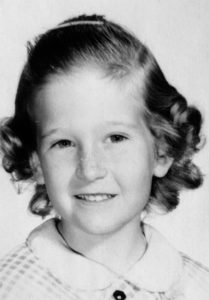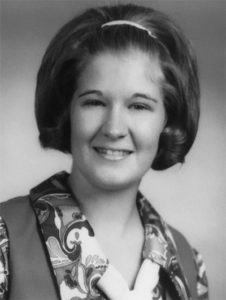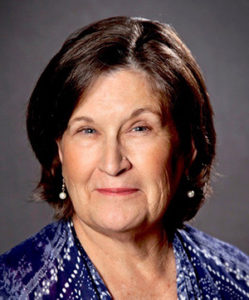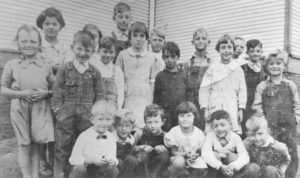By LAURA LEE LEATHERS

Laura Lee in first grade

Laura Lee her senior year of high school
I have a confession: I never attended preschool or kindergarten. In fact, kindergarten wasn’t even a grade.
Wheeler Grade School, located a mile from my country home in Hollis Township, Peoria County, Illinois, was built in the late 1890s. It was a white two-story building with a large bell outside. The playground consisted of a giant silver slide, monkey bars, a large merry-go-round, and even an underground bomb shelter.
Lara Randolph, my first-grade teacher, was responsible for teaching, disciplining and caring for the first four grades in one large classroom.
Then when I was in second grade, everyone moved to the brand-new Wheeler Grade School. Classes continued to be small, and most of the time I was the only girl with three or four boys.
My education included reading, writing, arithmetic, science, penmanship, geography, history, plays, and physical education. In fifth grade, reading lab was added. Kevin, a classmate, and I would go to reading lab, do our required work, pull out our Bibles and read together. He taught and challenged me to study the Word. Those moments influenced me significantly!
Several years later, I made the decision to trust Jesus. My desire to study the Bible increased. When I was in high school, I enrolled in the Moody Bible Institute discipleship correspondence courses, another life-changer.
God’s Word ALWAYS teaches us. Look at 2 Peter 1:3 — “as His divine power has given to us all things that pertain to life and godliness, through the knowledge of Him who called us by glory and virtue.”
Here are a few thoughts that I’ve learned regarding a biblical education.
Acknowledge the fear of the Lord
A biblical education begins with the fear of the Lord. “Fear” means reverential awe and acknowledgment that God is sovereign. In Proverbs 1:7, we are told this is the beginning of knowledge.
Study Deuteronomy 6:1-25. Again, the first thing to do was to “fear the LORD your God,” then keep His statutes and commandments. Next, the passage moves into what is known as the “shema,” which was to be taught to the children diligently.
There were three aspects of a child’s education: teach, talk, and walk the commandments of God, all day, every day. There were no textbooks, only scripture.
Being with Jesus builds boldness
Remember Peter and John? In the opinion of the Sadducees, “they were uneducated, common men” (Acts 4:13), yet their teaching was astonishing. Why? “They had been with Jesus.”
Because they’d been with Jesus, these men spoke with boldness, and lives were changed for God’s kingdom. Look at the prayer for boldness in verses 23-31.
Wherever our secular education may take us in the marketplace, people need to see we’ve been with Jesus. We need to be bold in our testimony and maintain a biblical worldview.
Complete, competent and equipped
As you study the New Testament, you’ll learn it’s God who supplies all we need “according to His riches in glory by Christ Jesus” (Phil. 4:19). It’s a promise!
Furthermore, we are complete in Christ (Col. 2:9-10). Notice the first 10 verses of Colossians 2. There is no other philosophy but that of Christ. In Him we have “all the treasures of wisdom and knowledge” (v. 3).
The word “competent” means adequate, or sufficient. “All scripture is breathed out by God and profitable for teaching, for reproof, for correction, and for training in righteousness, that the man of God may be competent, equipped for every good work” (2 Tim. 3:16-17, italics added).
Our education begins with the Word of God with a two-fold process: salvation and sanctification.
The Bible has the power to transform our hearts and renew our minds. The Bible should guide us in every aspect of our lives. Our belief system is to be grounded in scripture. Furthermore, we know that what we believe affects our character and our choices.
Reading, writing and arithmetic are the foundation of an education. Read the Word, write the Word, observe the science, and study the book of Numbers.
God wrote the Ten Commandments for Moses, gave instructions regarding the tabernacle’s measurements, designed the ark that Noah built, and gave the music and words for David to sing.
These were ordinary, common men, called and equipped by God to do His kingdom work. What is He calling you to do? Do you have a biblical education?

In this new season of her life, Laura Lee hopes to focus on her three passions: freelance writing, sharing and serving through hospitality, and cultivating Lady Laura’s Garden, a cut-flower farm. You can contact her at LauraLeeLeathers.com.


